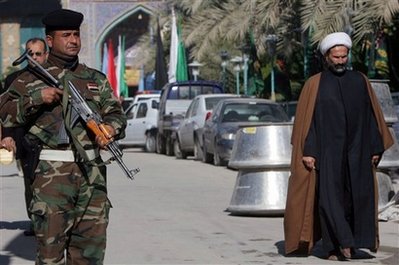Baghdad bombing kills 9
BAGHDAD: Iraqi officials say a bomb exploded at a funeral in a Shiite neighborhood of the capital, killing at least nine people and wounding 33 others.
Police and hospital officials say the bomb exploded inside a funeral tent in Baghdad's Sadr City, a predominantly Shiite neighborhood.
The officials spoke on condition of anonymity because they were not authorized to speak to media.
The killings come as Shiites from around the country commemorate the death of a revered Shiite saint, and authorities questioned whether the bomb was intended to hit such a commemoration.
THIS IS A BREAKING NEWS UPDATE. Check back soon for further information. AP's earlier story is below.
BAGHDAD (AP) — Staggered explosions targeting Shiite Muslim pilgrims killed at least 13 people and injured 74 on Thursday, authorities said, raising fears of further sectarian attacks at the approach of Shiite Islam's most solemn holiday.
The deaths come three days before the climax of Ashoura, when hundreds of thousands of Shiite pilgrims travel across Iraq to the holy city of Karbala. While Thursday's attacks were smaller than similar bombings in previous years, they demonstrated the continued ability of insurgents to incite sectarian tensions.
Police Maj. Muthana Khalid said a first bomb exploded around 2 p.m. Thursday in Hillah, the capital of Babil province, about 60 miles (95 kilometers) south of Baghdad. He said the second explosion came as police rushed to the scene 15 minutes later, a common tactic used by insurgents to maximize casualties.
The bombs targeted Shiite pilgrims who had gathered near a bus station in downtown Hillah, which is about 25 miles (40 kilometers) southeast of Karbala. People from around southern Iraq, which is overwhelmingly Shiite, make up the bulk of pilgrims traveling to Karbala.
A wrecked car lay at the attack site, and a pair of blood-covered slippers could be seen near damaged storefronts.
A provincial councilman was among those killed, Khalid said. Hospital physician Dr. Mohammed al-Zurfi also confirmed the casualties.
Hundreds of thousands of Shiites are expected to converge on the central city of Karbala for the Dec. 27 holiday to mourn the Prophet Muhammad's grandson, Imam Hussein, killed in 680 A.D. during a battle that sealed the split between Shiites and Sunnis.
The 10-day period leading up to Ashoura is marked by processions through streets and Shiite neighborhoods across Iraq in which devout Shiites beat themselves with swords and other instruments as a way to show their devotion and mourning for Imam Hussein.
The mourning period usually takes place under heavy security, and this year was no different. The Iraqi government assigned more than 25,000 police and soldiers to protect pilgrims during the celebrations.
The Shiite event was banned under former dictator Saddam Hussein and his minority Sunni government. But the majority of Iraq's roughly 29 million people are Shiites, and the mourning period gained renewed prominence after Saddam's ouster and a Shiite-led government came to power.
But the potent symbol of religious grief has made a powerful target for Sunni insurgents intent on ripping the country apart. In 2008, a suicide bomber blew himself up among Shiite pilgrims in Iskandariyah, marching to the shrine, killing at least 40 people and wounded 60.
As authorities have fortified the area in and around Karbala, extremists have moved their efforts to pilgrims traveling relatively unprotected from outside Karbala.
Although Ashoura is essentially a mournful occasion, Iraq's majority Shiites have also used it to showcase their dominance after decades of oppression under Saddam, turning out in large numbers to mark the occasion despite the threat of insurgent attacks.
Thursday's bombings come after three separate blasts targeting Shiite pilgrims in the Iraqi capital killed six people and wounded 43 others.






